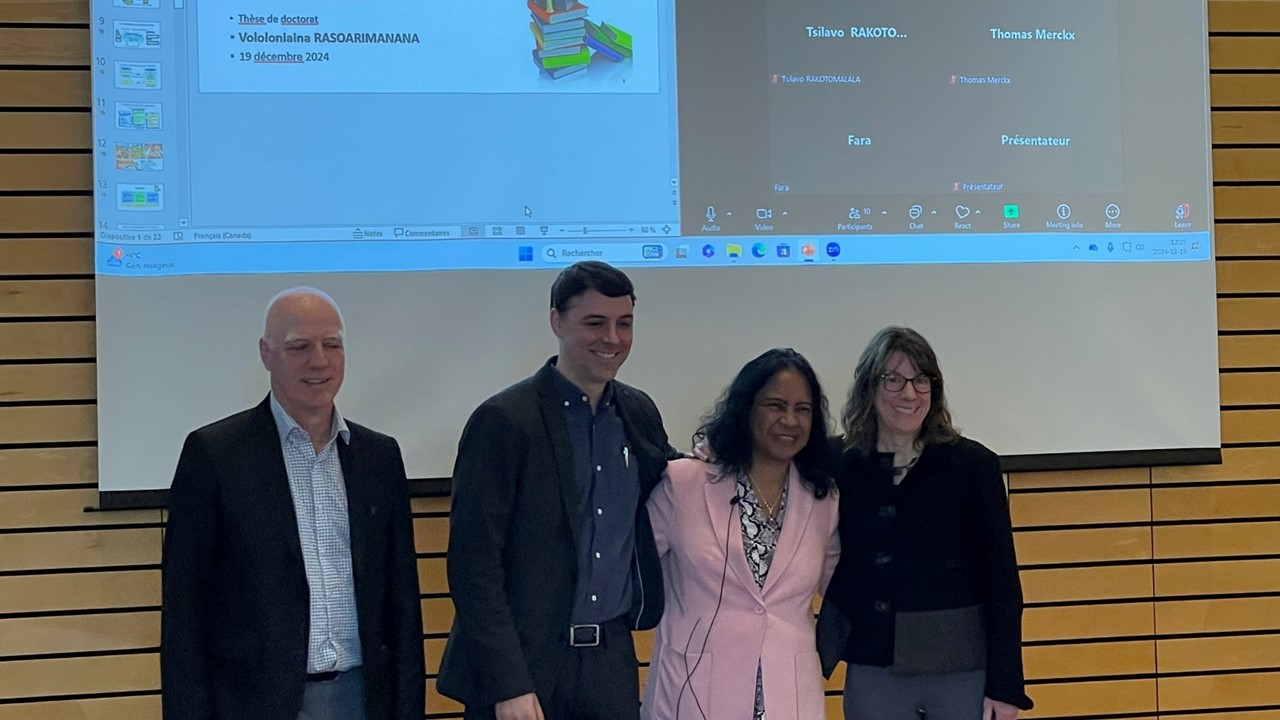Congratulations to Vololoniaina Rasoarimanana on her successful PhD defence!
Congratulations to Vololoniaina Rasoarimanana for successfully defending her doctoral thesis in forest sciences on Thursday, December 19, 2024. Conducted under the supervision of Nancy Gélinas and the co-supervision of Jean-François Bissonnette (Faculty of Forestry, Geography, and Geomatics, Université Laval), her thesis, titled « Societal and Ecological Resilience of Fokonolona Life Territories in Madagascar: Multilevel Institutional Factors,» highlights institutional dynamics and resilience strategies of local communities in the face of ecological and societal challenges.
Well done, Vololoniaina, for this remarkable milestone in your academic career! We wish you a bright future filled with professional success and personal achievements.

The jury members were :
- André Desrochers – Chair – Faculty of Forestry, Geography, and Geomatics – Laval University
- Nancy Gélinas – Research Director – Faculty of Forestry, Geography, and Geomatics – Laval University
- Jean-François Bissonnette – Co-Research Director – Faculty of Forestry, Geography, and Geomatics – Laval University
- Marie Fall – Non-UL examiner – Département des sciences humaines – Université du Québec à Chicoutimi
- Bruno Ramamonjisoa – Non-UL examiner – University of Antananarivo
- Bruno Sarrasin – External Examiner- Département d’études urbaines et touristiques – Université du Québec à Montréal
Congratulations again!
Abstract: In Madagascar, a megadiverse country, over 75% of the population is rural and directly dependent on renewable natural resources. Despite more than 30 years of national efforts and international cooperation, human development indices have remained low since the 1990s, while ecosystem degradation and biodiversity loss continue.
Nevertheless, since the 2000s, dozens of local communities have been recognized, both internationally and by their peers, for improving their living conditions while sustainably managing the natural and cultural heritage of their territories, despite the country’s recurring political and socio-economic crises. However, these communities remain vulnerable to the threat of land and communal wealth grabbing by a powerful minority holding political, financial, or other powers at local, national, and global levels.
In response to these challenges, and given the common issues at stake, community organizations have become involved in networks of collaboration, advocacy, and pressure from the local to the international level. These networks aim for structural and systemic transformations to make living territories viable, livable, and sources of equity, by tackling the socio-political and institutional causes of inequality and human, social as well as ecological impoverishment.
The general aim of this research is to contribute to the understanding and valorization of the institutional experiences, knowledge, know-how, and savoir-être of Malagasy communities in the development of their autonomy and their societal and ecological resilience.
More specifically, the thesis seeks to answer the following two questions: « What are the multi-level institutional factors that foster the development of autonomy and resilience in local Malagasy communities? And what will it mean, in the future, to scale up the impacts of development and nature conservation actions desired by communities and advocated by their technical and financial partners?»
This study is based on an in-depth qualitative and inductive analysis of two communities’ journeys and the institutional evolution of their national collaborative network, enriched by specific cases from other network members. The result of this first stage is an understanding of the creative and adaptive institutional dynamics of the Malagasy Fokonolona for the governance and collective management of common heritages in their living territories.
Next, the anchored theorization method was used to conceptualize the multi-level institutional factors that have contributed to the development of societal and ecological resilience in these communities. These factors fall into three main categories: the governance and management capacities of common heritages within living territories, the capacities of communities to engage in multi-level governance processes, and finally the capacities for intergenerational monitoring and transmission of common heritages.
In comparison with the reference literature, this thesis highlights the scientific contributions and conceptual specificities of these factors. The results of the analysis are also presented in the form of reference tools that can serve as benchmarks and discussion support for communities and their partners in defining their consensual action priorities and scaling up impacts.

